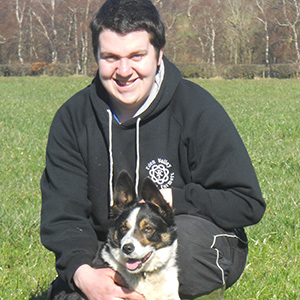Paul Barrow has been farming for as long as he can remember. The 30-year-old dairy farmer from North-West England grew up on the family farm – the same dairy farming estate he now manages with his parents and uncle.
"I’ve always enjoyed working outside in the fresh air and couldn’t see myself being stuck in an office," Paul said. Still, his parents encouraged him to take school seriously and to pursue further education. "The thinking was that having this broader skillset would come in handy to tackle the changes facing the sector."
A sector in flux
The face of farming is indeed changing, precipitated by advances in technology – but not only. Societal expectations are shifting. With climate change and biodiversity loss attracting greater attention on the global stage, farmers are expected to run operations with minimum impact on the environment and on the climate. Animal welfare is high on the agenda, too – demand for agricultural goods that are produced ethically is on the rise.

If farming as a whole is undergoing profound changes, the UK farming sector also has to contend with its own specific challenges. A shortage of farmers – with many coming out of farming even as the population in the UK continues to grow – is threatening the sector. Brexit – the departure of the United Kingdom from the European Union – is also fuelling uncertainty.
The COVID-19 outbreak has not spared dairy farmers either. Many have been unable to get their produce to market as supply chains ground to a halt. (Nestlé has committed to buying agreed volumes from farmers globally).
Keeping pace with change
Paul is a member of 'First Milk', the dairy co-operative that includes 81 farmers that Nestlé is supporting as part of its UK Dairy Agripreneurship program. Its purpose: to improve the livelihood of dairy farmers by helping them to get the best out of their businesses. The young farmers are coached on a number of areas, including advanced production management, financial management and biodiversity conservation practices.
What’s in it for Nestlé? The primary driver is a sustainable source of local milk. The goal is to achieve better milk quality through a more sustainable and efficient supply chain with lower environmental impact.
One aspect of the scheme consists of setting up benchmarking groups with other farms to identify potential areas of improvement – to deliver produce of the highest quality while staying as competitive as possible. "This has been useful in identifying the strengths and weaknesses of our farm and we have been able to make significant changes as a result of this," Paul said.
Better productivity – but not at any cost
Increasing productivity is only one of the many aspects of the scheme. Sustainability runs at the core of the program – Nestlé’s milk suppliers like Paul are encouraged to adopt greener agricultural production methods, to pay particular attention to soil health and to implement diffuse pollution prevention measures. It’s something that Paul has embraced wholeheartedly.
"We have invested substantially into hedgerow planting and into stonewall restoration," said Paul, adding that work had been done on the farm to prevent agricultural runoff from reaching nearby waterways. "We have also invested in better calf facilities to improve cow comfort."
Smart farming
In many ways, the program is also setting up farmers for success in 21st-century farming. Technology, as in other sectors, is unlocking new opportunities – and the scheme encourages farmers to fully harness its potential.

"Even since I have started farming, the leaps forward in the use of technology have been amazing," said Paul. Two years ago, the family fitted their cattle with ear tags which transmit, in real time, data about their individual heat and health status. "We have already seen positive results from using this technology," Paul said.
As part of the program, farmers also visit Nestlé factories and retailers to develop a better understanding of the supply chain – all the way down to consumers. They are also given the opportunity to exchange with decision makers in the agricultural sector. "Meeting with politicians and visiting the House of Parliament is something I certainly never imagined doing when I started farming," Paul said.
"This is what farming in the 21st century looks like".
The program falls under the broader umbrella of the group-wide Nestlé Needs YOUth initiative, whose ambition to help 10 million young people worldwide access economic opportunities by 2030. The Nestlé Needs YOUth initiative is structured around three areas: agripreneurship, entrepreneurship, and employment & employability – helping young people get prepared to thrive in tomorrow’s workplaces.






